We’re going early again this week as we have a big focus on this week’s big report, and we’re sure you all want to know (although there is a lot of coverage). There is other news as well.
Augar recommendations for the Review of Post-18 Education and Funding
So finally, the long awaited report has landed. Either it changed quite a lot in the last few weeks (no minimum threshold based on 3 Ds at A-level) or the leaks were inaccurate. Actually the leaks were pretty inaccurate, because although the £7500 tuition fee loan cap is there, there are recommendations to make up the difference. And that part was very badly trailed, probably because the recommendations are not simple and don’t make an easy soundbite.
The commentary will be extensive and you can read it for yourselves, we’ll give you some links below and recipients of Wonkhe and the Research Professional HE updates will get more in the coming days. In the meantime:
- there is an excellent summary thread from Mary Curnock-Cook on Twitter
- UUK’s response is here, describing it as a potential “wolf in sheep’s clothing”, with a list of concerns, including the top up grants, but also foundation courses, the risk of confusion, narrow conceptions of value, restrictions on diversity and choice and the impact on social mobility
- The NUS response welcomes much of it but rejects the premise of “low value” courses
- Wonkhe start their coverage with a short summary (there will be more) – Jim Dickinson has a blog about the hidden nuggets
- HEPI have a couple of blogs on widening participation and scoring the report out of 10 on the points that HEPI had made in their response to the call for evidence (Score: 6.5/9, one they couldn’t mark)
We think that there is a risk with summarising and cherry picking the “most interesting” bits so we give you the whole set of recommendations below – with a little bit of commentary in places. There’s some context and narrative first, so skip down to the big table if you want to go straight to the recommendations.
The report defines the purposes of post-18 education – nicely pulled out in a tweet by Mike Ratcliffe.
And the principles:
In setting about our task, we have been guided by a set of principles. Some of these were self-evident to us at the start, others have been developed in the light of emerging evidence during the panel’s life. The principles and their rationale are set out below.
Principle 1. Post-18 education benefits society, the economy, and individuals. The potential benefits of an increasingly educated adult population have guided our work. But increasing the sheer volume of tertiary education does not necessarily translate into social, economic and personal good. That depends on the quality, accessibility and direction of study.
Principle 2. Everyone should have the opportunity to be educated after the age of 18.We have noted the disparity of resources between higher and further education and the steep decline in opportunities for education and training in later life. We have this in mind in seeking to create an integrated and sustainable post-18 system with opportunities for the whole population.
Principle 3. The decline in numbers of those getting post-18 education needs to be reversed. In many developed economies, increased participation in tertiary education has been associated with productivity growth over the past half century but in England – where attention has focused largely on degree-level study – the total number of people involved in post-18 education has in fact declined. This decline needs to be reversed urgently.
Principle 4. The cost of post-18 education should be shared between taxpayers, employers and learners. This was the defining principle of the seminal Dearing Report (1997) and continues to have resonance: the alternatives are simply inconceivable. Getting the taxpayer to pay for everything is unaffordable. Getting learners to pay all their own costs is unfair to those of limited means. Getting employers to pay for the whole system would put too much emphasis on economic value alone. A shared responsibility, in our view, is the only fair and feasible solution.
Principle 5. Organisations providing education and training must be accountable for the public subsidy they receive. The receipt of taxpayer funding, whether this is directly through grants or indirectly through forgiveable loans, carries with it the expectation of transparency and accountability for the purposes to which it is put and the outcomes that it delivers. There should be no sense of entitlement.
Principle 6. Government has a responsibility to ensure that its investment in tertiary education is appropriately spent and directed. The government should consider public spending on tertiary education alongside its spending on other parts of the public sector and should hold the sector accountable whilst respecting its intellectual freedom and academic autonomy.
Principle 7. Post-18 education cannot be left entirely to market forces. The idea of a market in tertiary education has been a defining characteristic of English policy since 1998. We believe that competition between providers has an important role to play in creating choice for students but that on its own it cannot deliver a full spectrum of social, economic and cultural benefits. With no steer from government, the outcome is likely to be haphazard.
Principle 8. Post-18 education needs to be forward looking. The future challenges of technological innovation, artificial intelligence and shorter job cycles will require greater labour market flexibility. The post-18 education system needs to respond to this: doing more of the same will not be enough.
Here is the summary of the proposals from the front of the report itself:
- Strengthening technical education – England needs a stronger technical and vocational education system at sub-degree levels to meet the structural skills shortages that are in all probability contributing to the UK’s weak productivity performance. Improved funding, a better maintenance offer, and a more coherent suite of higher technical and professional qualifications would help level the playing field with degrees and drive up both the supply of and demand for such courses.
- Increasing opportunities for everyone – Despite the very large increase in participation in higher education by young people, the total number of people involved in tertiary education has declined. Almost 40 per cent of 25 year olds do not progress beyond GCSEs as their highest qualification and social mobility shows little sign of improvement. Our recommendations seek to address these problems by reversing cuts in adult skills provision and encouraging part time and later life learning.
- Reforming and refunding the FE college network – Further education colleges are an essential part of the national educational infrastructure and should play a core role in the delivery of higher technical and intermediate level training. Our recommendations are intended to reform and refund the FE college network by means of an increased base rate of funding for high return courses, an additional £1bn capital investment over the coming spending review period and investment in the workforce to improve recruitment and retention. Rationalisation of the network to even out provision across over-supplied and under-supplied areas, funding for some specialised colleges and closer links with HE and other providers would help establish a genuinely national system of higher technical education.
- Bearing down on low value HE – There is a misalignment at the margin between England’s otherwise outstanding system of higher education and the country’s economic requirements. A twenty-year market in lightly regulated higher education has greatly expanded the number of skilled graduates bringing considerable social and economic benefits and wider participation for students from lower socio-economic groups. However, for a small but significant minority of degree students doing certain courses at certain institutions, the university experience leads to disappointment. We make recommendations intended to encourage universities to bear down on low value degrees and to incentivise them to increase the provision of courses better aligned with the economy’s needs.
- Addressing higher education funding – Generous and undirected funding has led to an over-supply of some courses at great cost to the taxpayer and a corresponding under-supply of graduates in strategically important sectors. Our recommendations would restore more control over taxpayer support and would reduce what universities may charge each degree student. Universities should find further efficiency savings over the coming years, maximum fees for students should be reduced to £7,500 a year, and more of the taxpayer funding should come through grants directed to disadvantaged students and to high value and high cost subjects. [see CHAPTER 3 and in particular 3.2 to 3.5 below]
- Increasing flexibility and lifetime learning – Employment patterns are changing fast with shorter job cycles and longer working lives requiring many people to reskill and upskill. We recommend the introduction of a lifelong learning loan allowance to be used at higher technical and degree level at any stage of an adult’s career for full and part-time students. To encourage retraining and flexible learning, we recommend that this should be available in modules where required. We intend that our proposals should facilitate transfer between different institutions and we make proposals for greater investment in so-called ‘second chance’ learning at intermediate levels. We endorse the government’s National Retraining Scheme, which we believe to be a potentially valuable supplement to college based learning.
- Supporting disadvantaged students – Disadvantaged students need better financial support, improved choices and more effective advice and guidance to benefit fully from post‑18 education. Our recommendations would provide them with additional support by reintroducing maintenance grants for students from low income households, and by increasing and better targeting the government’s funding for disadvantaged students.
- Ensuring those who benefit from higher education contribute fairly – Most graduates benefit significantly from participating in higher education – as does the economy and wider society. We therefore endorse the established principle that students and the state should share the cost of tertiary education. We support the income-contingent repayment approach as a means of delivering this fairly, with those benefitting the most making the greatest contribution. However, public misunderstanding is high and better communication is required, including a new name, the Student Contribution System. We believe that more graduates should repay their loans in full over their lifetimes, and recommend extending the repayment period for future students and effectively freezing the repayment threshold. These changes – with the reduction in fees – would apply only to students entering higher education from 2021-22 at the earliest: students starting before then would not be affected. Some aspects of the present system appear to be unfairly punitive and we recommend reducing students’ in-study interest charges and capping graduates’ lifetime repayments.
- Improving the apprenticeship offer – Apprenticeships can deliver benefits both for apprentices and employers but there is evidence of a mismatch between the economy’s strategic requirements and current apprenticeship starts. Our recommendations, together with recent government reforms, look to make further improvements in the quality of the apprenticeship offer by providing learners with better wage return information, strengthening Ofsted’s role – and thus the quality of providers – and better understanding and addressing the barriers SMEs face within the apprenticeship system. We have considered how best to use the finite funding which is available for apprenticeships and recommend that apprenticeships at degree level and above should normally be funded only for those who do not already have a publicly-funded degree.
And the actual recommendations are at the back:
CHAPTER 2: SKILLS
2.1 The government should introduce a single lifelong learning loan allowance for tuition loans at Levels 4, 5 and 6, available for adults aged 18 or over, without a publicly funded degree. This should be set, as it is now, as a financial amount equivalent to four years’ full-time undergraduate degree funding. [This will be widely welcomed but has the potential to be very expensive if these loans turn out to be written off at high levels over time – the hope will be that these courses will directly lead to improved earnings and so there will be a better chance of repayment?]
2.2 Learners should be able to access student finance for tuition fee and maintenance support for modules of credit-based Level 4, 5 and 6 qualifications. [“bitesize” learning will also be welcomed as a solution for mature students to replace traditional part-time study which has collapsed]
2.3 ELQ rules should be scrapped for those taking out loans for Levels 4, 5 and 6. [this will be widely welcomed]
2.4 Institutions should award at least one interim qualification to all students who are following a Level 6 course successfully. [this is interesting]
2.5 Streamline the number and improve the status of Level 4/5 qualifications.
2.6 The OfS should become the national regulator of all non-apprenticeship provision at Levels 4 and above.
2.7 Government should provide additional support and capital funding to specific FE colleges in order to ensure a national network of high quality technical provision is available. Government should work with the OfS to determine how best to allocate this using, for example, quality indicators and analysis of geographic coverage. [this will be welcomed although the targeting and the suggestions of metrics (a TEF for FE?) may not be so welcome]
2.8 From 2021-22 the fee cap for Level 4 and 5 qualifications currently prescribed by the OfS should be £7,500 – the same as that proposed for Level 6 qualifications and in line with current arrangements for prescribed HE qualifications. Longer term, only kitemarked Level 4 and 5 qualifications that meet the new employer-led national standards should be able to charge fees up to the Level 6 cap and be eligible for teaching grant. From that point, any other Level 4 and 5 courses should have a lower fee cap.
2.9 The current age cap should be removed so that a first ‘full’ Level 3 is available free to all learners whether they are in work or not.
2.10 Full funding for the first ‘full’ Level 2 qualification, for those who are 24 and over and who are employed should be restored.
2.11 The careers strategy should be rolled out nationally so that every secondary school is able to be part of a careers hub, that training is available to all careers leaders and that more young people have access to meaningful careers activities and encounters with employers.
CHAPTER 3: HIGHER EDUCATION
3.1 The average per-student resource should be frozen for three further years from 2020/21 until 2022/23. On current evidence, inflation based increases to the average per-student unit of resource should resume in 2023/24. [the interesting part here is not the freeze, as that was expected, but the proposal for an increase in 2023/24. See page 93 of the report – “We believe that the gradual effects of a funding freeze would give HEIs time to rise to the challenge of greater efficiency and redesigned business models, whilst maintaining the quality of provision. However on current evidence we believe that attempts to generate further savings over this proposed funding freeze would jeopardise the quality of provision”.
3.2 The cap on the fee chargeable to HE students should be reduced to £7,500 per year. We consider that this could be introduced by 2021/22. [so no cliff edge this year, may affect student numbers next year as some defer. They say on page 210 that ALL policies embed in 2021/22 for new students so although it isn’t clear in the section, this would be for new students only. Also worth noting on page 205 they note that actually students may not be better off under the current scheme in the long run because of changes to repayments (see below) – but explaining that to students (and parents) will be a nightmare – the headline reduction will be what many people see]
3.3 Government should replace in full the lost fee income by increasing the teaching grant, leaving the average unit of funding unchanged at sector level in cash terms. [page 95 “We firmly believe that the total reduction in resources from the fee cut must be matched with an equivalent increase in average per student grant funding from the government, so that the average per student resource to the sector stays level in cash terms]
3.4 The fee cap should be frozen until 2022/23, then increased in line with inflation from 2023/24. [see 3.1 above]
3.5 Government should adjust the teaching grant attached to each subject to reflect more accurately the subject’s reasonable costs and its social and economic value to students and taxpayers. Support for high-quality specialist institutions that could be adversely affected should be reviewed and if necessary increased.
- [The link to cost was well trailed in the press, but the Secretary of State focussed on the part about social and economic value to students and taxpayers – actually the report covers both. This is worth looking at in more detail – page 95/96 says that the current “system under-funds certain high cost subjects to the detriment of the economy in general and the government’s Industrial Strategy“, that “the current long-term taxpayer subsidy is poorly directed” and that “Government currently has very limited control over the substantial taxpayer investment in higher education”.
- There is more detail of the analysis that they did on page 72.
- They propose that the OfS should carry out a review of the funding rates for different subjects, having “regard to economic and social value and consider support for socially desirable professions such as nursing and teaching”, and then rebalance funding towards high cost and strategically important subjects and to subjects that add social as well as economic value”.
- They go on: “we would expect some subjects to receive little or no subject specific teaching grant over the £7500 base rate” – and this is where they add in about specialist institutions offering the highest quality provision.
- This is really interesting stuff – but it is not at all clear how this would work and how economic and social value would be evaluated. Anyone thinking that the debate over use of raw salary data in this process might be answered one way or the other by Augar will be sadly disappointed – the issue is put firmly into the hands of the OfS. See also pages 104 and 105 for the things they rejected
- Critics of using LEO in this context will like this bit on page 87: ““Limitations of the IFS early-career earnings analysis….
- The data do not distinguish between full and part-time work, which is likely to affect comparisons of earnings between men and women, and they also do not cover the self-employed.
- The results we discuss are for earnings up to the age of 29 whereas the principal benefit in earnings for graduates tends to arrive in the following decade and thus we would expect full lifetime earnings for most graduates to generate higher premiums than those shown.
- However, the current data excludes the cost of foregone earnings during study and loan repayments after graduation which need to be taken into account for a full assessment of lifetime returns.
- Earnings are largely a product of the labour market for particular skills and qualifications and should not be regarded as a measure of teaching quality. They also vary according to location: a graduate working in an economic cold spot is likely to earn less than her or his counterpart working in a hot spot.
- However, if analysed with care, the data provide an insight into the early career financial consequences of degree study and will be a useful source of information for students, government and HEIs alike.”]
3.6 Government should take further steps to ensure disadvantaged students have sufficient support to access, participate and succeed in higher education. It should do this by:
- Increasing the amount of teaching grant funding that follows disadvantaged students, so that funding flows to those institutions educating the students that are most likely to need additional support.
- Changing the measure of disadvantage used in the Student Premium to capture individual-level socio-economic disadvantage, so that funding closely follows the students who need support.
- Requiring providers to be accountable for their use of Student Premium grant, alongside access and participation plans for the spend of tuition fee income, to enable joined up scrutiny.
[Page 97 says that the current system prioritises access over successful participation, “fails to resource adequately those institutions that admit a large proportion of their students from disadvantaged backgrounds, relies on too limited an evidence base of what works best”. They want to “discard measures or prior academic attainment and area-based measures of participation” (goodbye POLAR) and look at individual measures of socio-economic disadvantage to ensure that support is better directed. They want a pupil premium style minimum sum for each student. They also say that all the other changes should not mean a cut in the overall levels of spend on disadvantaged students.]
3.7 Unless the sector has moved to address the problem of recruitment to courses which have poor retention, poor graduate employability and poor long term earnings benefits by 2022/23, the government should intervene. This intervention should take the form of a contextualised minimum entry threshold, a selective numbers cap or a combination of both.
- [Here’s a threat, then. So 3Ds are not dead (see page 100 for the research), and neither are numbers caps. But imposed on a course by course basis for students that “persistently manifest poor value for money for students and the public”. They mention indicators such as employment, earnings and loan repayments. They suggest the caps would be time limited – capping the numbers of students eligible for financial support who could be admitted to the course” (see page 102).
- So three years for the sector “to put its house in order”. That gives the government time to sort our technical alternatives and the impact would be offset but the uptick in demographics from 2021.]
3.8 We recommend withdrawing financial support for foundation years attached to degree courses after an appropriate notice period. Exemptions for specific courses such as medicine may be granted by the OfS. [People are asking questions about this – it’s odd at first glance. They say (page 103) that “it is not hard to conclude that universities are using foundation years to create four-year degrees in order to entice students who do not otherwise meet their standard entry criteria”. But is that a bad thing? The report concludes that it is a bad thing because of the fee and loan implications, and so it would be better to have access courses (usually in partnership with FE) on lower fees, better loan terms and a standalone qualification. They say have a two year delay on implementing this recommendation]
CHAPTER 4: FURTHER EDUCATION
4.1 The unit funding rate for economically valuable adult education courses should be increased. [no-one will disagree but it will be expensive. There’s a chart on page 124 which suggests what they mean by “economically valuable”. It means higher level courses, it seems]
4.2 The reduction in the core funding rate for 18 year-olds should be reversed.
4.3 ESFA funding rules should be simplified for FE colleges, allowing colleges to respond more flexibly and immediately to the particular needs of their local labour market.
4.4 Government should commit to providing an indicative AEB that enables individual FE colleges to plan on the basis of income over a three-year period. Government should also explore introducing additional flexibility to transfer a proportion of AEB allocations between years on the same basis.
4.5.1 Government should provide FE colleges with a dedicated capital investment of at least £1 billion over the next Spending Review period. This should be in addition to funding for T levels and should be allocated primarily on a strategic national basis in-line with Industrial Strategy priorities.
4.5.2 Government should use the additional capital funding primarily to augment existing FE colleges to create a strong national network of high quality provision of technical and professional education, including growing capacity for higher technical provision in specific FE colleges.
4.5.3 Government should also consider redirecting the HE capital grant to further education. [that’s interesting – they suggest that £1billion needs to be invested.]
4.6.1 The structure of the FE college network, particularly in large cities, should be further modified to minimise duplication in reasonable travel to learn areas.
4.6.2 In rural and semi-rural areas, small FE colleges should be strongly encouraged to form or join groups in order to ensure sustainable quality provision in the long term. [consistent with the pressure on schools and academies to combine]
4.7 Government should develop procedures to ensure that – as part of a collaborative national network of FE colleges – there is an efficient distribution of Level 3, 4 and 5 provision within reasonable travel-to-learn areas, to enable strategic investment and avoid counterproductive competition between providers.
4.8 Investment in the FE workforce should be a priority, allowing improvements in recruitment and retention, drawing in more expertise from industry, and strengthening professional development.
4.9 The panel recommends that government improve data collection, collation, analysis and publication across the whole further education sector (including independent training providers). [As noted above, perhaps an equivalent of TEF for FE and all the other related metrics – on top of Ofsted requirements where they apply. They compare this critically with schools as well as HE (see page 137)]
4.10 The OfS and the ESFA should establish a joint working party co-chaired by the OfS and ESFA chairs to align the requirements they place on providers and improve the interactions and exchange of information between these bodies. The working party should report to the Secretary of State for Education by March 2020. [These will be interesting interactions. The OfS is meant to be “light-touch” and “risk-based”, remember. But it would be good to see them take a more similar approach – as universities registering with the ESFA to provide apprenticeships are aware, the requirements are different]
4.11 FE colleges should be more clearly distinguished from other types of training provider in the FE sector with a protected title similar to that conferred on universities.
CHAPTER 5: APPRENTICESHIPS
5.1 The government should monitor closely the extent to which apprenticeship take up reflects the priorities of the Industrial Strategy, both in content – including the need for specific skills at Levels 3 through 5 – and in geographic spread. If funding is inadequate for demand, apprenticeships should be prioritised in line with Industrial Strategy requirements.
5.2 The government should use data on apprenticeships wage returns to provide accessible system wide information for learners with a potential interest in apprenticeships.
5.3 Funding for Level 6 and above apprenticeships should normally be available only for apprentices who have not previously undertaken a publicly-supported degree. [ELQ by the back door?]
5.4 Ofsted become the lead responsible body for the inspection of the quality of apprenticeships at all levels.
5.5 No provider without an acceptable Ofsted rating should receive a contract to deliver training in their own right (although a provider who has not yet been inspected could sub-contract from a high-quality provider pending their own inspection).
5.6 The IfATE and the DfE (through the ESFA) should undertake a programme of work to better understand the barriers that SMEs face in engaging with the apprenticeship system and put in place mechanisms to address these, including raising awareness of the programme and making the system easier to navigate.
5.7 The IfATE improve transparency when processing standards that have been submitted for approval. Trailblazer groups and providers should have a clear indication of progress, available on-line, so they can start to plan, recruit and invest within workable timelines.
5.8 All approved providers of government-funded training, including apprenticeship training, must make clear provision for the protection of learners in the case of closure or insolvency.
CHAPTER 6: STUDENT CONTRIBUTIONS
6.1 Continue the principle of loans to cover the cost of fees combined with income-contingent contributions up to a maximum. [NB they have not looked at PG loans – see page 166]
6.2 Set the contribution threshold at the level of median non-graduate earnings so that those who are experiencing a financial benefit from HE start contributing towards the cost of their studies. This should apply to new students entering HE from 2021/22.Adjust the lower interest threshold to match, with the higher interest threshold moving by the same amount. This should apply to new students entering the system from 2021/22. [That’s a reduction from £25,000 to £23,000 at current rates. Note it went up to £25,000 from £21,000 in 2018 in a hasty attempt by the PM to appeal to the “youth vote” in a move welcomed by many (because the promised indexation for the threshold was abandoned) but also said to be regressive (because it reduced the total amount repaid by the highest earners). The proposal is that it should be a floating threshold, linked to median earnings, and not implemented until 2021/22, so they expect it would be £25,000 then and when the first cohort of students start repaying it would be around £28,000 (see page 170)]
6.3 Extend the repayment period to 40 years after study has ended so that those who have borrowed continue to contribute while they are experiencing a financial benefit. This should apply to new students entering the system from 2021/22. [This is the big change and is why the main headline fee cut does not save many students much overall]
6.4 Remove real in-study interest, so that loan balances track inflation during study. This should apply for new students entering the system from 2021/22. [This is a tweak, but an important one, because this is one of those optical things that makes students really cross, as they incur interest at 3% plus inflation while studying. A student on a maximum maintenance loan incurs £3800 in interest while studying on a three year course (see page 172)]
6.5 Retain the post-study variable interest rate mechanism from inflation to inflation plus 3 per cent. [Many have called for this to be scrapped but the report thinks that’s a trade-off not worth making. They also don’t adopt the arguments about moving away from RPI to CPI – some will be disappointed]
6.6 Introduce a new protection for borrowers to cap lifetime repayments at 1.2 times the initial loan amount in real terms. This cap should be introduced for all current Plan 2 borrowers, as well for all future borrowers. [This hasn’t been much covered in the press coverage so far – but it is interesting. It addresses the “squeezed middle” who pay back more slowly and thus pay back more than the highest earners. As the 40 year period makes that problem worse, this is a mitigation for it (see pages 174/5)]
6.7 Introduce new finance terms under the banner of a new ‘student contribution system’. Define and promote the system with new language to make clearer the nature of the system, reducing focus on ‘debt’ levels and interest and emphasising contribution rates. [Hurray, the rebranding. Widely anticipated although it will take a mammoth effort to change national cultural expectations on this after everyone from the PM down has banged on about student debt. This is a huge job.]
CHAPTER 7: MAINTENANCE
7.1 The government should restore maintenance grants for socio-economically disadvantaged students to at least £3,000 a year.
[This is really interesting, has been widely welcomed including by the PM who has taken the credit for it and blamed George Osborne and Sajid Javid for a mistake” in her statement this morning. The report says that this is a particular problem because of the assumption of parental support and that it impacts the choices that disadvantaged students make. But…is £3000 enough? The report says (page 192 “Combined with the reduction in the level of tuition fee recommended in chapter 3, this recommendation would see the maximum debt for a disadvantaged student on graduation from a 3 year degree decrease by £15,000, from approximately £60,000 to approximately £45,000”. They looked at the Welsh system and said it was not a priority for investment to make such a significant (and expensive) change).
7.2 The expected parental contribution should be made explicit in all official descriptions of the student maintenance support system. [Yes, alongside the other comms challenges, this is a big and important one.]
7.3 Maximum maintenance support should be set in line with the National Minimum Wage for age 21 to 24 on the basis of 37.5 hours per week and 30 weeks per year. [That’s a small cut outside London “We do not believe that students, who in practice are often studying for less than 37.5 hours, should receive a higher income than the minimum received by young people in full-time employment” (see page 193)]
7.4 In delivering a maintenance system comprising a mix of grant, loan and family contribution, the government should ensure that:
- The level of grant is set as high as possible to minimise or eliminate the amount of additional loan required by students from disadvantaged backgrounds.
- The income thresholds within the system should be increased in line with inflation each year.
7.5 The new post-18 maintenance support package should be provided for all students taking Level 4 to 6 qualifications. The government should take steps to ensure that qualifications which are supported through the maintenance package are of high quality and deliver returns for the individual, society, economy and taxpayer.
7.6 The OfS should examine the cost of student accommodation more closely and work with students and providers to improve the quality and consistency of data about costs, rents, profits and quality.
[Interesting comments on page 196:
- “We believe that HEIs retain a responsibility for overall student welfare and delivering value for money and that this extends to university accommodation, whether or not they are the direct provider.”
- And “The public subsidy of student maintenance, much of which is spent on accommodation, gives the OfS a legitimate stake in monitoring the provision of student accommodation in terms of costs, rents, profitability and value for money”
- Also “We suggest a detailed study of the characteristics and in-study experience of commuter students and how to support them better.”(page 195)]
7.7 Funding available for bursaries should increase to accommodate the likely growth in Level 2 and Level 3 adult learners.
7.8 The support on offer to Level 2 and Level 3 learners should be made clearer by both the government and further education colleges so as to ensure that prospective learners are aware of the support available to them.
And there’s more
There are also other bits that are not reflected in the many, many recommendations but may be seized on by Ministers and others. In the section on Market Competition, page 78, the report says that “‘post-18 education cannot be left entirely to market forces’.81 We have already established that England’s market in HE has produced substantial social, economic and personal benefits but have noted that price competition has not developed as was originally expected. This is rational behaviour in a market where price is taken as a signal of quality.”
It goes on:
“It is of concern to us that these marketing approaches sometimes include cash and in-kind inducements to prospective students to accept a place. It would be an unacceptable use of public funds for universities to recycle tuition fees, funded by state-subsidised income contingent loans, as gifts over which the state has no recourse. A recent study for Universities UK found “… perceptions that universities are becoming more like commercial businesses, driven by profit” and we would not be surprised if over-enthusiastic marketing had contributed to this perception. We further note three aspects of academic practice that could be interpreted as being a consequence of market competition.
- Grade inflation. The growth in the proportion of first and upper second-class degrees awarded (see box) has been too great to suggest plausibly that it can be entirely attributed to a genuine improvement in the quality of students’ academic performance. It is not unreasonable to assume that part of the explanation is that academic assessment has become a means of reputational enhancement, albeit how this has happened is unclear.84 We note the intervention in March 2018 on this matter by the Secretary of State for Education.
- Lower entry requirements. An increasing proportion of students with lower prior attainment are now attending university. We welcome this but not at any price. Low prior attainment, measured by A level and BTEC grades, is associated with dropping out from university studies, to the financial and often emotional cost of the student. From the 2016/17 cohort, as many as 12.8 per cent of students with UCAS tariff points between 0 and 100 (equivalent to D and E at A-level in the old tariff scheme), and 11.6 per cent of students with BTECs at any level, did not progress past their first year of a degree. This is about double the 6.3 per cent drop out rate for students as a whole. For the lowest attaining BTEC students the drop-out rates are well above 15 per cent. At fourteen UK universities, projections of the number of students likely to obtain a degree is below 70 per cent; the lowest has a degree projection rate of 51.7 per cent with 28.1 per cent of its students dropping out entirely rather than transferring or obtaining another award such as a Level 4 or Level 5 qualification.
- Unconditional offers. Responsibly used, unconditional offers can have benefits, particularly in attracting students from disadvantaged backgrounds – but the emphasis has to be on ‘responsible’. We agree with the OfS that “Universities must not resort to pressure selling tactics in promoting unconditional offers”87 and we note the intervention in April 2018 on this matter by the Secretary of State for Education.
They don’t have a recommendation in this area, but they do use these examples as justification for why the system needs to change – and government given back more control through grants and targeting of funding.
There’s also a kick at TEF: “the use of metrics in the TEF process must be robust and command confidence. The Royal Statistical Society has raised concerns about the statistical validity of the current approach and the risk of the system being “gamed”.72 We await the outcome of the on-going independent review of the TEF, led by Dame Shirley Pearce, which is examining this and other issues.” It is really interesting to think about what, given this, they think will be the basis for their cost and value-based assessment for the top-up funding. They manage not to suggest anything. All they say about it is on page 75: “We expect this assessment to be contested within the sector. Typically, it has been resistant to measures of performance based on inputs (contact hours), outputs (student satisfaction) and outcomes (graduate salaries). There are undoubtedly weaknesses in all of these metrics, including the TEF framework which brings them together, but they give universities important information about their own performance and we encourage the sector to use them constructively.”
And what of employers? When interviewed during the process, Philip Augar made a lot of the role of employers in the system. In the opening principles, Principle 4 is “the cost of post-18 education should be shared between taxpayers, employers and learners”. But there is nothing new here for FE, lots of references to employers working with FE, and of course the apprenticeship levy.
They also address the unintended consequences in terms of the cross-subsidy for research funding (see page 93): “Universities in the UK educate the graduates, especially in STEM fields, needed to achieve this target. Our proposals on rebalancing funding towards high‑cost and high‑value subjects, discussed below, are intended to encourage this and are likely to result in more funding going to institutions with a strong research base. We also make recommendations to protect high quality specialist institutions. We recognise that there will be concerns about the impact of the resource freeze on some institutions with pockets of research excellence. We are of the view that it is for government, business and other interested bodies to fund research adequately and directly.”
So what now? The coverage will be excited and excitable. Justine Greening has already condemned the whole thing as regressive and called for a radical new student contribution system. But will a new leader of the Tory party take it up? Will it get lost in party politics and Brexit? Will it be too unattractive in terms of cost (remember the spending review) and not attractive enough in terms of attracting voters (young and older)?. They have costed it all (page 204).
We’ll just have to wait and see. But the main thing is that, despite several menacing bits, when taken as a whole it is not the nightmare scenario for HE that some were predicting, but neither is it a silver bullet. It’s complex, subtle and intended to work as a package – if existing or new leaders start cherry picking, there is plenty of potential for the nightmare to materialise. And the OfS have a LOT of work to do.
At a speech launching the review, Theresa May said: “I was not surprised to see the panel argue for the reintroduction of means-tested maintenance grants both for university students and those studying for higher technical qualifications. Such a move would ensure students are supported whichever route they choose, and save those from the poorest backgrounds over £9,000. It will be up to the Government to decide, at the upcoming Spending Review, whether to follow this recommendation. But my view is very clear: removing maintenance grants from the least well-off students has not worked, and I believe it is time to bring them back.”
On reforming tuition fees, she argued: “There is much to be said for the panel’s proposal to cut fees and top up the money from Government, protecting the sector’s income overall but focussing more of that investment on high-quality and high-value courses. I know there are some, including the Labour Opposition, who will reject this finding because they want to abolish fees altogether. Such a move would be regressive and destructive – hurting our institutions and limiting the opportunities for our young people.”
Shadow Education Secretary Angela Rayner commented: “The report alone does nothing to address the burning injustices facing our education system. With no formal Government response, no extra funding and no guarantee that the recommendations will be implemented by her successor the Augar review epitomises May’s legacy as Prime Minister and this shambolic Tory government – all talk, empty promises and very little action.”
Speaking on LBC earlier, Chancellor Philip Hammond warned: “We won’t be able to prioritise every area. If we want to be able to spend some of that fiscal headroom that I have accumulated, we first have to get the Brexit issue resolved.”
By the way, as well as the report, there is a whole lot of supporting material including the outcomes of the call for evidence that informed the review. Some nuggets:
- For student finance, more than half of students responding thought fees should be reduced or abolished. There was a mix of views from providers over whether the fees charged to students at present covered the cost of courses, with views further split about the advantages and disadvantages of applying differential fees for different subjects and how this might work. Student loans were seen by many as burdensome and off-putting, in particular for part-time and mature students. Many respondents suggested that means-tested maintenance grants should be reintroduced.
- Respondents and respondent groups had a range of views of what constituted value for money in post-18 education including student experience, employability and commercial terms, as well as the wider benefits to society. Some questioned the need for the concept. HE providers and HE employees tended to favour value in terms of student experience and qualifications achieved, whereas students and graduates valued employability and the earnings advantage of a degree, seen as a return on their investment.
- Overall employability was perceived as the most important measure of value for money, followed by value to society and the student experience.
- Value for money was considered to be improved either if the cost of education to students is reduced, or if the quality of education and its contribution to the economy and to society is increased.
- Respondents identified financial barriers as the most common difficulty for disadvantaged students, including debt (both real and the prospect of it), covering costs out of term time and inadequate maintenance support.
And the Tory leadership contest?
New potential candidates are joining the fray all the time. There are so many it is hard to work out what they all stand for. The whittling down process can’t start until after 10th June. Until then we will have to put up with remarkably similar soundbites and some startling announcements as they try to be distinctive. 11 (or 12, or more) views to canvas on every issue that comes up from Augar to football to British Steel. Oh dear.
This internal squabble really matters – because whoever it is, is going to try and sort out Brexit and nothing else will get done until they do. The solution might be trying to create a cross party consensus to pass the Withdrawal Agreement legislation and leave with the PM’s deal in October (seems vanishingly unlikely). Or by going back to Brussels with a backstop unicorn and trying to renegotiate (surely even more unlikely than it was when Parlaiment voted on it). Or throwing the whole thing up in the air and asking for a long extension for a people’s vote (exceptionally unlikely because any candidate who would go for this will surely not be selected unless they are the last person standing). Or going for a no-deal Brexit by default, with no legislation if Parliament won’t play ball – surely very unlikely indeed given that this is the only thing Parliamnet agrees on. Any hint of this would surely spark another Letwin-style rebellion enabled by the Speaker (leading to what, though – there’s no time. And surely the EU wouldn’t grant an extension in these circumstances). The timing is critical, because the summer recess takes Parliament to the middle of September, unless they come back early.
And it may all be irrelevant. If the new leader faces a vote of no confidence fairly early on, and is someone that enough Tories can’t work with (whichever approach they are taking), will enough rebels back it and force a general election? Then surely the EU would grant an extension. And all bets would be off, although it seems pretty likely that a general election would lead to another hung Parliament, probably very hung indeed, with a fair number of MPs for the Brexit Party (unless the new Tory leader wins them over) and more Lib Dems and Greens. So then it would all be about coalitions. Tricky.
So who could it be? The BBC have a list although Philip Hammond hasn’t ruled himself out and isn’t on the list yet. There are some predictions and some more details on The Week here
EU student fees and finance after Brexit
After the recent storm when it was pointed out that EU students would at some point after Brexit stop being eligible for tuition fee loans and “Home” fee status, Chris Skidmore this week confirmed that the current arrangements would continue for students starting courses in 2020-21, continuing the “one year at a time” approach that has been adopted since the EU referendum.
Universities Minister Chris Skidmore said: We know that students will be considering their university options for next year already, which is why we are confirming now that eligible EU nationals will continue to benefit from home fee status and can access financial support for the 20/21 academic year, so they have the certainty they need to make their choice.”
“Work to determine the future fee status for new EU students after the 2020/21 academic year is ongoing as the Government prepares for a smooth and orderly exit from the EU as soon as possible. The Government will provide sufficient notice for prospective EU students on fee arrangements ahead of the 2021/2022 academic year and subsequent years in future.”
Subscribe!
To subscribe to the weekly policy update simply email policy@bournemouth.ac.uk
JANE FORSTER | SARAH CARTER
Policy Advisor Policy & Public Affairs Officer
Follow: @PolicyBU on Twitter | policy@bournemouth.ac.uk
 20 May 2019
20 May 2019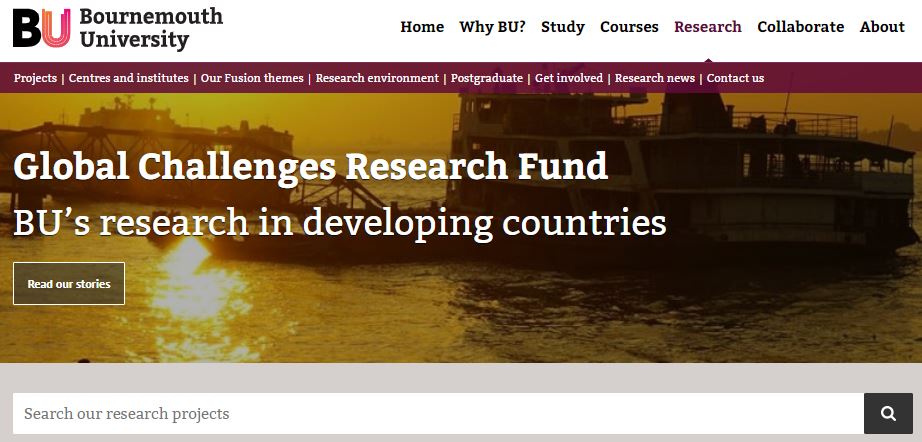
 This is rather whizzy! The EPSRC have created an ‘Investment timeline’, which sets out major calls under various strategies, including, ISCF, GCRF, Future Leaders Fellowships, Strength in Places, etc. It also sets out new schemes that are being introduced shortly. Have a look
This is rather whizzy! The EPSRC have created an ‘Investment timeline’, which sets out major calls under various strategies, including, ISCF, GCRF, Future Leaders Fellowships, Strength in Places, etc. It also sets out new schemes that are being introduced shortly. Have a look 


 e
e  The
The 



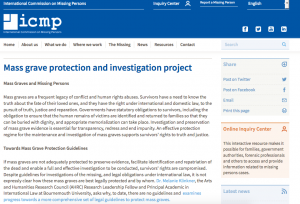 The AHRC funded ‘Mass Grave Protection for Truth and Justice’ project webpage has gone
The AHRC funded ‘Mass Grave Protection for Truth and Justice’ project webpage has gone 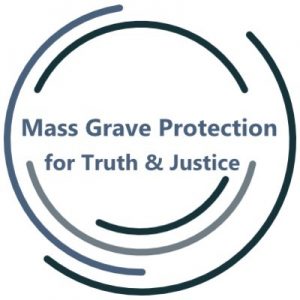 The final mass grave protection guideline will be available to download in English and in nine translated versions through the project page. This will help further the effective protection regime for the maintenance and investigation of mass graves to ultimately support survivors’ rights to truth and justice.
The final mass grave protection guideline will be available to download in English and in nine translated versions through the project page. This will help further the effective protection regime for the maintenance and investigation of mass graves to ultimately support survivors’ rights to truth and justice.
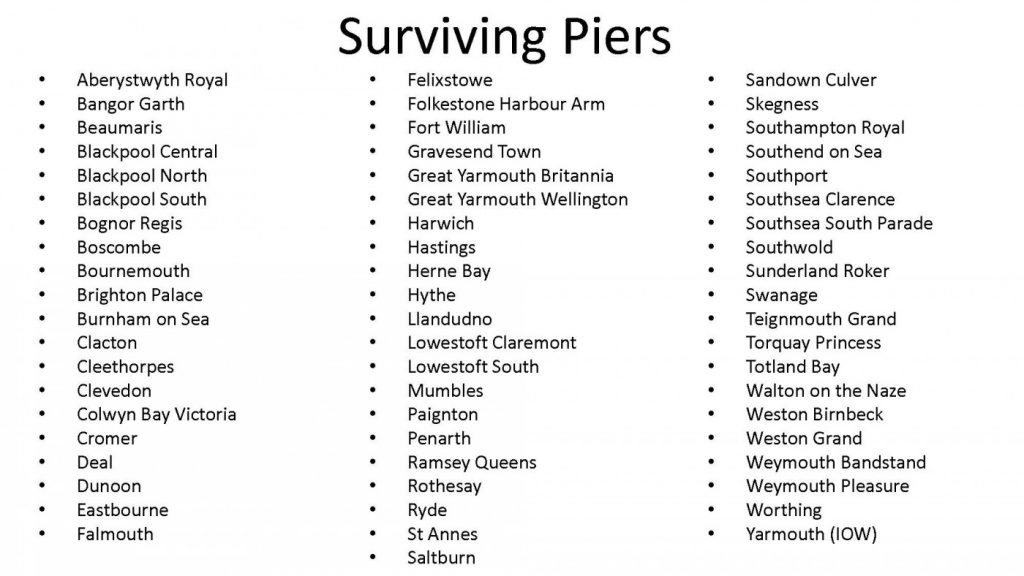 Anya’s Café Scientifique talk covered the rise and development of British seaside piers and considered their changing roles and purpose during the last 200 years. The current challenges faced by seaside piers were also examined, including the threats facing these structures in an era of climate change, rising sea levels, and storm surges. The issue of funding and costs of piers was considered and the question of ‘who pays’ for these iconic seaside heritage assets was discussed.
Anya’s Café Scientifique talk covered the rise and development of British seaside piers and considered their changing roles and purpose during the last 200 years. The current challenges faced by seaside piers were also examined, including the threats facing these structures in an era of climate change, rising sea levels, and storm surges. The issue of funding and costs of piers was considered and the question of ‘who pays’ for these iconic seaside heritage assets was discussed.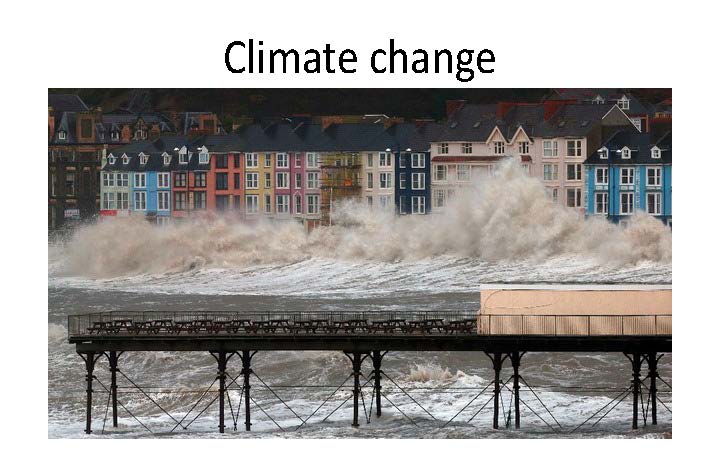
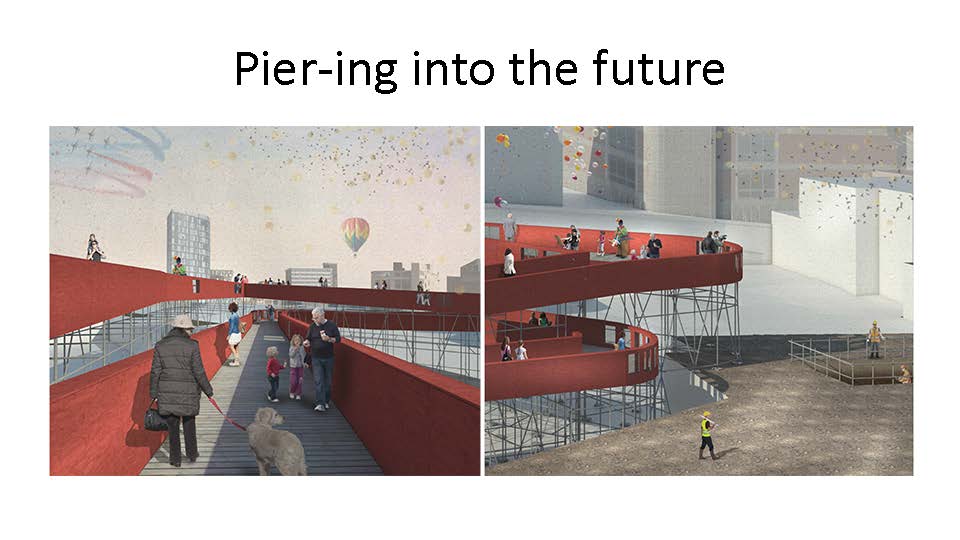
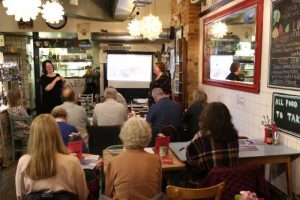 Anya said ‘the experience of presenting at Café Scientifique was enjoyable and enlightening. It was really insightful to hear about people’s experience of piers and how they value and engage with these structures. It was also good to see the levels of engagement and discussion on the issue of climate change and how seaside piers might be used in the not-too distant future as a source of blue energy production, meaning that the form and function of piers will continue to adapt in the 21st century’.
Anya said ‘the experience of presenting at Café Scientifique was enjoyable and enlightening. It was really insightful to hear about people’s experience of piers and how they value and engage with these structures. It was also good to see the levels of engagement and discussion on the issue of climate change and how seaside piers might be used in the not-too distant future as a source of blue energy production, meaning that the form and function of piers will continue to adapt in the 21st century’.



 INTERREG Channel programme has pre-announced an event on flooding to be held on 10 July, 2019 in London.
INTERREG Channel programme has pre-announced an event on flooding to be held on 10 July, 2019 in London.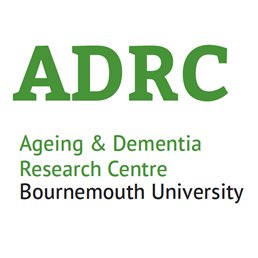 Exciting news from the Ageing and Dementia Research Centre.
Exciting news from the Ageing and Dementia Research Centre.













 From Sustainable Research to Sustainable Research Lives: Reflections from the SPROUT Network Event
From Sustainable Research to Sustainable Research Lives: Reflections from the SPROUT Network Event REF Code of Practice consultation is open!
REF Code of Practice consultation is open! BU Leads AI-Driven Work Package in EU Horizon SUSHEAS Project
BU Leads AI-Driven Work Package in EU Horizon SUSHEAS Project ECR Funding Open Call: Research Culture & Community Grant – Apply now
ECR Funding Open Call: Research Culture & Community Grant – Apply now ECR Funding Open Call: Research Culture & Community Grant – Application Deadline Friday 12 December
ECR Funding Open Call: Research Culture & Community Grant – Application Deadline Friday 12 December MSCA Postdoctoral Fellowships 2025 Call
MSCA Postdoctoral Fellowships 2025 Call ERC Advanced Grant 2025 Webinar
ERC Advanced Grant 2025 Webinar Update on UKRO services
Update on UKRO services European research project exploring use of ‘virtual twins’ to better manage metabolic associated fatty liver disease
European research project exploring use of ‘virtual twins’ to better manage metabolic associated fatty liver disease